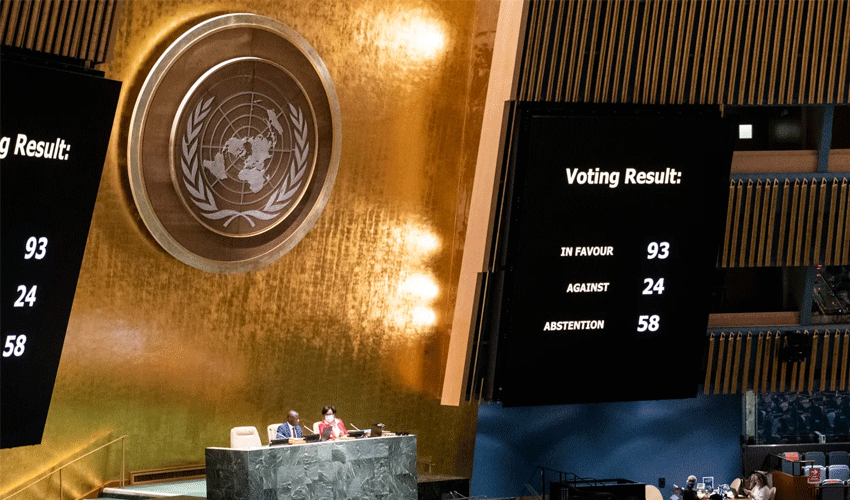The United States sided with Russia in two separate votes at the United Nations, marking the third anniversary of Moscow’s full-scale invasion of Ukraine.
The move has deepened divisions between Washington and its European allies, raising fresh concerns over America’s commitment to transatlantic security.
The first instance came at the United Nations General Assembly (UNGA) in New York, where a European-drafted resolution condemning Russia’s aggression and reaffirming Ukraine’s territorial integrity was put to vote.
While the resolution passed with 93 votes in favour, the US joined Russia and 16 other states in voting against it. Sixty-five nations abstained.
Ukrainian Deputy Foreign Minister Mariana Betsa, in a strongly worded statement, stressed the need for global unity against Moscow’s military actions. “We need to reconfirm that the aggression should be condemned and discredited, not rewarded,” she said.
The second development took place at the United Nations Security Council (UNSC), where the US, in a rare move, drafted its own resolution calling for an end to the war but omitting any direct criticism of Russia.
The measure, which made no mention of Moscow’s invasion, was passed with 10 votes in favour. However, key US allies, including the United Kingdom and France, abstained, after their attempts to amend the resolution were vetoed.
Britain, France, Denmark, Greece, and Slovenia all opted not to support the measure, reflecting growing discomfort within the Western bloc over Washington’s evolving approach to the conflict.
Deepening transatlantic rift
The votes come at a time of strained relations between the Trump administration and key European allies. The White House’s approach to Ukraine has undergone a significant transformation under President Donald Trump, who has been accused of seeking closer ties with Moscow at the expense of traditional alliances.
The sharp divide was further underscored by high-profile diplomatic visits. French President Emmanuel Macron arrived in Washington this week in a bid to mend differences, while British Prime Minister Sir Keir Starmer is scheduled to meet President Trump on Thursday.
Trump’s administration has repeatedly questioned America’s long-term role in European security, with the latest UN developments adding to unease in European capitals.
Speaking after the Security Council vote, the acting US envoy to the UN, Dorothy Camille Shea, defended Washington’s resolution as a “simple historic statement… that looks forward, not backwards.” She described it as a measure focused on a single objective—ending the war.
However, European diplomats voiced concern over the US decision to break ranks. “Rarely has the US been so at odds with its closest allies,” said one senior European official on condition of anonymity.
Since Russia launched its full-scale invasion of Ukraine three years ago, the Security Council has been largely deadlocked due to Russia’s veto power as a permanent member. As a result, the UNGA has served as the primary forum for debating the war, though its resolutions are non-binding.
Impact on US-Europe relations
Analysts suggest that Washington’s latest actions could further erode confidence among European allies, particularly as the war in Ukraine continues with no clear resolution in sight.
The Trump administration’s reluctance to directly confront Moscow stands in contrast to its predecessor’s policies, which sought to isolate Russia through economic sanctions and military aid to Kyiv.
For Ukraine, the US shift in stance is a worrying development. While Washington continues to provide military support to Kyiv, its political messaging at the UN signals a departure from the previously unified Western approach.
“This is not just a procedural vote; it is a test of where the US stands on global security,” said a European diplomat. “For Ukraine, for NATO, and for all of Europe, the implications are serious.”


























